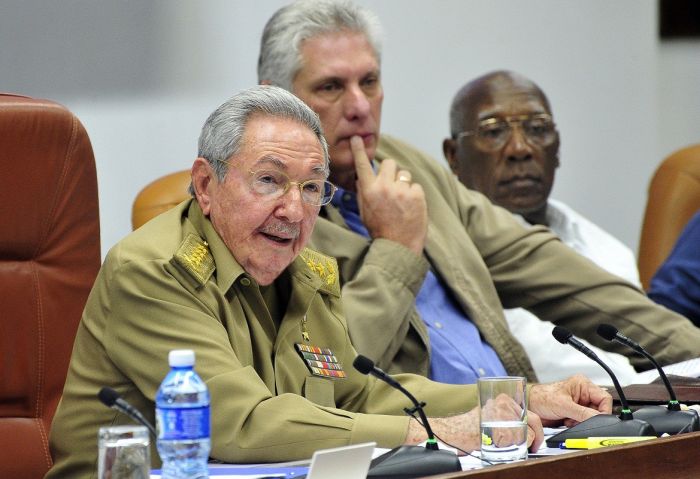
Participants in the meeting discussed issues such as housing, currency exchange and were presented a report on the study to amend the Constitution
The Cuban Communist Party Central Committee held a two-day working plenary session headed by its First Secretary, President Raul Castro, to analyze issues relevant to the update of the country’s social and economic model, considered a complex process that kicked off in 2011 following the 6th Congress of the political organization.
The evaluation of the policies implemented since 2011 was high on the session’s agenda, an issue previously considered in two occasions by the Party’s Political Bureau, according to a front-page article published today in Granma newspaper.
The evaluation of the policies implemented since 2011 was high on the session’s agenda, an issue previously considered in two occasions by the Party’s Political Bureau, according to a front-page article published today in Granma newspaper.
According to the article, the first three years of work were marked by a dynamic implementation of those policies, which took slower pace later due to the complex nature of the measures and also because of mistakes during the planning of processes and its control.
The critical analysis also mentioned economic and financial limitations that affected an appropriate support of a group of actions that required investment.
During 2016 and 2017 efforts particularly aimed at improve what had been achieved. The session considered that the update of the Cuban social and economic model has proven to be an issue of great complexity, the article explained.
At present, all processes relevant to the issue are under revision, while priorities include the study on the unification of the double currency circulating in Cuba; the drawing up of a National Economic and Social Development Program up to the year 2030, as well as the analysis and improvement of any measure requiring so and corresponding measures.
The plenary session approved an evaluation report and future actions to give continuity to the update of the economic model with larger participation by the Central Government Administration entities and other national agencies.
Speaking at the session, the First Secretary of the Cuban Communist Party, Raul Castro, considered that the implementation of all measures have led to hard work and despite mistakes and inefficiencies admitted by the session, the current situation is more favorable than some years ago.
Raul said that the main task for all communists is facing the problems, making better planning to allocate resources where they are needed and not waiting for solutions to be given from the upper levels of government, but contributing creative and rational initiatives.
Raul said that the main task for all communists is facing the problems, making better planning to allocate resources where they are needed and not waiting for solutions to be given from the upper levels of government, but contributing creative and rational initiatives.
The First Party Secretary reiterated the need for saving resources and struggle with intelligence and to keep the unity of the nation.
Other aspects analyzed during the session included the future recovery of the built stock, homes in particular. There are little over 3 824 000 houses in Cuba, according to the latest 2012 census, out of which 39 percent are in bad or inappropriate technical shape. The recovery of the built stock has been planned in not less than 10 years, prioritizing the repair of homes in worse shape over the next five years.
Finally, the Secretary of the Cuban Council of State Homero Acosta submitted the session a report approved by the Party’s Political Bureau on studies for a future reform of the Cuban Constitution, which will include main economic, political and social transformations that have stemmed from the accords of the 6th and 7th congresses of the Communist Party. The project includes the ratification of the irrevocable character of Cuban socialism and the leading role of the Communist Party in Cuban society.
 Escambray ENGLISH EDITION
Escambray ENGLISH EDITION





Escambray reserves the right to publish comments.